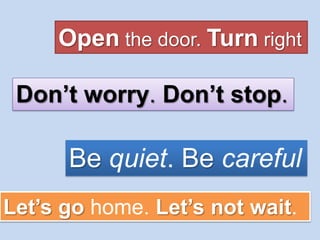Report
Share

More Related Content
What's hot
What's hot (20)
Advice - should / ought to / had better / must / have to / cant

Advice - should / ought to / had better / must / have to / cant
Types of films movies esl vocabulary matching exercise worksheet

Types of films movies esl vocabulary matching exercise worksheet
More from EOI Alcalá de Guadaíra
More from EOI Alcalá de Guadaíra (20)
The Past: Using the Narrative Tenses to tell anecdotes

The Past: Using the Narrative Tenses to tell anecdotes
I wish + past simple_perfect for wishes andregrets

I wish + past simple_perfect for wishes andregrets
Unreal Conditionals - second and third conditionals

Unreal Conditionals - second and third conditionals
2 c Imperatives and Suggestions
- 1. Open the door. Turn right Don’t worry. Don’t stop. Be quiet. Be careful Let’s go home. Let’s not wait.
- 2. Orders or instructions + imperatives = verb (infinitive). – imperatives = don’t + verb (infinitive). Open the door. Turn right Don’t worry. Don’t stop. Add please to be polite: Open the door, please.
- 3. • We often use be + adjective in imperatives: Be quiet, Be careful, etc. • Don’t use a pronoun with imperatives: Be quiet - be you quiet Don’t smoke - Don’t smoke you
- 4. • Use Let’s + verb (infinitive) to make suggestions Let’s go home. • Use Let’s not + verb to make a negative suggestion: Let’s not wait.
